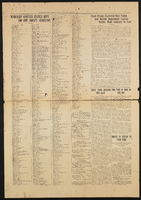Search the Special Collections and Archives Portal
Search Results

Transcript of interview with Richard Caldwell by Lloyd Henderson, March 06, 1980
Date
Archival Collection
Description
Text
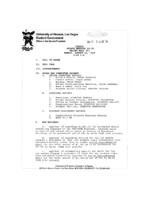
Meeting minutes for Consolidated Student Senate University of Nevada, Las Vegas, August 22, 1994
Date
Archival Collection
Description
Text

Transcript of interview with Bruce Layne by Claytee D. White, June 18, 2004
Date
Archival Collection
Description
Bruce Layne came to Las Vegas in March of 1955 when he was 10 years of age. He attended High school at Bishop Gorman and college at the University of Nevada Las Vegas where he received a B.S. in Economics. In college, he played baseball for three years and was named All Conference Player in 1966. Growing up in Las Vegas, two of his closest long time friends are Governor Bob Miller and Tito Tiberti. Bruce later went on to become the President of Layne & Associates Insurance which was the largest Insurance Agency in Nevada. Bruce tells fabulous stories of his 40-year experience in the Las Vegas community. When he first arrived there were only about 25,000 people living here. Since then, Bruce has been witness to the enormous growth the city has undergone. Throughout the interview, he discusses his book, My Gift, which he wrote after he discovered he had Parkinson's disease in 1999. The book contains valuable advice on life and it has touched the lives of many people who have read it. Today Bruce Layne is relentlessly fighting his battle with Parkinson's disease both for himself and for thousands of others. He continues to have a positive attitude and is supported by his wife, Sherry Layne, and his two sons, Chad and Trevor. VI
Text

Yvanna Cancela oral history interview: transcript
Date
Archival Collection
Description
Oral history interview with Yvanna Cancela conducted by Monserrath Hernández and Barbara Tabach on February 27, 2020 for the Latinx Voices of Southern Nevada Oral History Project. Yvanna Cancela, Nevada State Senator, discusses her personal history growing up in Miami, Florida and her studies at Northwestern University. She talks of working for Senator Harry Reid's campaign in Las Vegas, which led to her organizing efforts for the Culinary Workers Union Local 226. Yvanna recalls being appointed to the Nevada State Senate in 2016 as the first female state senate majority. In addition to fulfilling her duties as the Co-Majority Whip, she worked on the Joe Biden campaign and is the Executive Director of the Citizenship Project. After this interview was conducted, Yvanna received her Juris Doctorate from the William S. Boyd School of Law at the University of Nevada, Las Vegas. Subjects discussed include: Miami, Florida; Nevada State Senate; The Citizenship Project.
Text

Transcript of interview with Dr. Catherine Bellver by Caryll Batt Dziedziak, November 13, 1995
Date
Archival Collection
Description
Dr. Catherine Bellver is a woman with tenacity. How else could one describe her drive to create the Women's Studies Program spanning fifteen years? As a faculty member in the Department of Foreign Languages, Dr. Bellver first joined the Women's Studies steering committee in 1979. In the following decade, the committee oversaw the formation of the Women's Studies Program, including: procuring administrative and faculty support, creating bylaws and course criteria, critiquing proposed cross-listed courses, and selecting course offerings. During that period she also worked with a volunteer group to create and staff the first Women's Center on campus. In the early Nineties, she played an instrumental role in the presentation of four public colloquia that addressed key issues pertaining to women. Dr. Bellver acted as interim director of the Women's Studies Program while overseeing the search for a permanent director. She continued to remain involved with the Women's Studies program, serving as faculty member on several committees. She has also worked in the Women's Caucus on the regional and national levels of the Modem Languages Association Dr. Bellver is currently Distinguished Professor of Spanish in the Department of Foreign Languages at the University of Nevada, Las Vegas. Her work has appeared in journals such as Anales de la Literature Espanola Contemporanea, Hispanic Review, Hispanofila, Insula, Journal of Interdisciplinary Studies, Monographic Review/Revista Monografica, Revista de Estudios Modernos, Revista Hispanica Moderna, Romance Notes and Romanic Review. Dr. Bellver's participation in the creation of the Women's Studies Program illustrates how critical institutional and social progress can result from the commitment of a determined group of individuals. Her decades of involvement in creating an academic arena for the study of women and gender issues underscores the significance of women's contributions to the history of Las Vegas. In addition to the history of the Women's Studies Program at the University of Nevada Las Vegas this interview contains information regarding the creation of the first Women's Center on campus.
Text
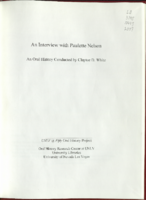
Transcript of interview with Paulette Nelson by Claytee D. White, March 2, 2009
Date
Archival Collection
Description
Text
Minutes Temple Beth Sholom Board of Directors meetings, September 1952 - December 1956
Date
Archival Collection
Description
The meeting minutes of the board of directors of Temple Beth Sholom, then known as the Jewish Community Center of Las Vegas, Inc., include the proceedings of meetings held from 1952 to 1956. Also included are periodic reports from committees of the board such as Jewish education, cemetery, and building committees, and budget reports.
Text
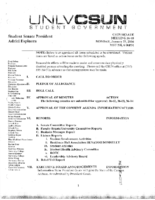
Meeting minutes for Consolidated Student Senate, University of Nevada, Las Vegas, January 23, 2006
Date
Archival Collection
Description
Text
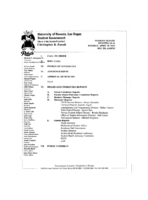
Meeting minutes for Consolidated Student Senate, University of Nevada, Las Vegas, April 28, 2003
Date
Archival Collection
Description
Text

